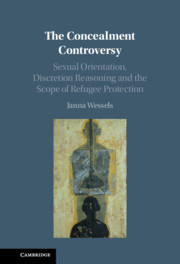 The Concealment Controversy
The Concealment Controversy Book contents
- The Concealment Controversy
- The Concealment Controversy
- Copyright page
- Contents
- Figures
- Tables
- Acknowledgements
- 1 The Concealment Controversy
- 2 Unpacking the Controversy
- Part I Tracing ‘Discretion’ Reasoning
- Part I Conclusions
- Part II Exploring the Limits of Protection
- Conclusion
- 10 Conundrums, Paradoxes and Productive Instability
- Annex
- Bibliography
- Index
10 - Conundrums, Paradoxes and Productive Instability
from Conclusion
Published online by Cambridge University Press: 19 July 2021
- The Concealment Controversy
- The Concealment Controversy
- Copyright page
- Contents
- Figures
- Tables
- Acknowledgements
- 1 The Concealment Controversy
- 2 Unpacking the Controversy
- Part I Tracing ‘Discretion’ Reasoning
- Part I Conclusions
- Part II Exploring the Limits of Protection
- Conclusion
- 10 Conundrums, Paradoxes and Productive Instability
- Annex
- Bibliography
- Index
Summary
The concluding chapter argues that the scope of refugee protection forms a complex picture of instability. Due to the refugee definition’s double rationale – Convention grounds and persecution – and the consequent conundrum of whether to focus on persecutor or persecuted, the scope of protection is subject to a variety of tensions and ambiguities which overlap and intersect in significant and complex ways. For example, human rights standards can be used as a benchmark when it comes to deciding both, which identities and which actions, fall within or outside of the scope of protection. And although ‘discretion’ reasoning is created at the level of the Convention ground, it moves around and is often debated in other elements of the refugee definition. These complex connections make everything unstable – not only ‘discretion’ itself but also its rejection. ‘Discretion’ functions as a patch for all these instabilities that emerge from the refugee definition. The book shows both the breadth and the depth of the ‘discretion’ logics: it is an unresolvable issue at the core of the refugee concept that surfaces at different layers, in different locations and in different ways – if it is put down in one place and form it will resurface in another place and in another form.
Keywords
- Type
- Chapter
- Information
- The Concealment ControversySexual Orientation, Discretion Reasoning and the Scope of Refugee Protection, pp. 233 - 252Publisher: Cambridge University PressPrint publication year: 2021
